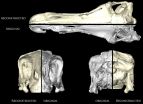Trial results reveal first targeted treatment to boost survival for oesophageal cancer
2014-11-05
(Press-News.org) PATIENTS with a specific type of oesophageal cancer survived longer when they were given the latest lung cancer drug, according to trial results being presented at the National Cancer Research Institute (NCRI) Cancer Conference today (Wednesday).
Up to one in six patients with oesophageal cancer were found to have EGFR duplication in their tumour cells and taking the drug gefitinib, which targets this fault, boosted their survival by up to six months, and sometimes beyond.
This is the first treatment for advanced oesophageal cancer shown to improve survival in patients whose initial course of chemotherapy treatment has failed. It is also the first time a targeted treatment of any kind has proved effective in this disease, although chemotherapy and some targeted drugs have shown benefit in the second line treatment of other cancers of the digestive system including stomach cancer.
The trial – called 'TRANS-COG' – looked for extra copies of a gene called EGFR in tumour samples from 295 deceased oesophageal cancer patients who had received either gefitinib or placebo as part of the COG trial.
Of the 48 patients who had extra EGFR copies in their tumour cells, 13 per cent of those who had gefitinib survived for at least a year, while none of the patients who received a placebo survived that long.
Giving gefitinib to patients who didn't have extra EGFR copies made no difference to how long they survived. This suggests that EGFR testing could identify a subgroup of oesophageal patients who may benefit from gefitinib.
Dr Russell Petty, a medical oncologist from the University of Aberdeen, who is presenting the data, said: "This is exciting news in our field. It's the first time any drug has shown survival benefit for oesophageal patients who have stopped responding to their initial treatment. To date there's been disappointingly little progress in treating this cancer type, which kills nearly 8,000 people a year and sadly is often diagnosed late making it difficult to treat successfully.
"It's thought that up to 16 per cent of oesophageal cancer patients could benefit from gefitinib, providing valuable extra months of life to people who would otherwise have had very few options available to them."
Irene Black's late husband, Roy, was diagnosed with oesophageal cancer in January 2011 aged 78, after having problems swallowing and later being rushed into A&E for an emergency endoscopy. He was given an intense course of chemotherapy and radiotherapy at Aberdeen Royal Infirmary, but unfortunately the cancer stopped responding and the family were told it was incurable. It was then that Roy decided to join the trial.
Irene said: "There is no doubt in my mind that, if it wasn't for the trial, Roy wouldn't have been with us for so long. He managed to get back to his bingo, which he loved, surrounded by friends and we booked a four night holiday on the west coast at Fort William. I will always treasure that holiday - if it wasn't for the trial we may not have had the special time together at the end.
"It's comforting to know that the trial Roy took part in when he was alive may help patients with this devastating type of cancer live longer in the future."
Professor Matt Seymour, NCRI's clinical research director said: "Although the survival benefit for these patients was relatively modest, this trial is an important step forwards for a type of cancer where progress in treatment has fallen behind other cancers in recent decades. While there has been some success in treating other cancers of the digestive system, oesophageal cancer remains extremely difficult to treat, with only 13 per cent of patients surviving five years or more.
"It will be interesting to see whether this drug, if properly targeted at the right patients, could offer similar benefits to those with earlier stage disease and also whether other drugs that target EGFR could prove to be even more effective."
INFORMATION:
The TRANS-COG trial was funded by the Scottish Government's Chief Scientist Office, the Cameron Clinical Academic Fellowship and the Grampian Gastro-oesophageal Cancer Research Fund (GASTROCAN).
ELSE PRESS RELEASES FROM THIS DATE:
2014-11-05
SCIENTISTS have found a pattern of genetic 'switches' – chemical marks that turn genes on or off - that are linked to breast cancer's spread to the brain, according to research* presented at the National Cancer Research Institute Cancer Conference in Liverpool today (Wednesday).
The researchers, based at the University of Wolverhampton, studied 24 breast cancers that had spread to the brain, along with samples from the original breast tumour, and found a handful of genes with faulty switches.
Crucially, two of the genetic switches became faulty early on in the ...
2014-11-05
Everyone knows the scene: a basketball player at the free throw line, bouncing the ball as he concentrates on the basket. It's a tight game, and his team needs this point. He regularly makes baskets from much farther away while avoiding defenders, but now, when all is calm, he chokes and misses the basket, and his team loses. Recent research from The Johns Hopkins University suggests that in situations like this, performance depends on two factors: the framing of the incentive in terms of a loss or a gain, and a person's aversion to loss.
"We can measure someone's loss ...
2014-11-04
For years, scientists have debated how best to assess brain levels of oxytocin, a hormone implicated in social behaviors. Now, researchers at the Stanford University School of Medicine have found the first direct evidence in children that blood oxytocin measurements are tightly linked to levels of oxytocin in cerebrospinal fluid, which bathes the brain.
Low oxytocin levels in blood and CSF are both correlated to high anxiety levels, the research also showed. The findings will be published online Nov. 4 in Molecular Psychiatry.
"So many psychiatric disorders involve ...
2014-11-04
Fossils are usually deformed or incompletely preserved when they are found, after sometimes millions of years of fossilization processes. Consequently, fossils have to be studied very carefully to avoid damage, and are sometimes they are difficult to access, as they might be located in remote museum collections. An international team of scientists, led by Dr. Stephan Lautenschlager from the University of Bristol now solved some of these problems by using modern computer technology, as described in a recent issue of the Journal of Vertebrate Paleontology.
The team consisting ...
2014-11-04
In a study that included nearly 38,000 patients, those diagnosed with nonobstructive coronary artery disease (CAD) had a significantly increased risk of heart attack or death one year after diagnosis, according to a study in the November 5 issue of JAMA.
Nonobstructive coronary artery disease (CAD) is atherosclerotic plaque that would not be expected to obstruct blood flow or result in anginal symptoms (such as chest pain). Although such lesions are relatively common, occurring in 10 percent to 25 percent of patients undergoing coronary angiography, their presence has ...
2014-11-04
Among patients with metastatic melanoma, treatment with a combination of the drugs sargramostim plus ipilimumab, compared with ipilimumab alone, resulted in longer overall survival and lower toxicity, but no difference in progression-free survival, according to a study in the November 5 issue of JAMA.
F. Stephen Hodi, M.D., of the Dana-Farber Cancer Institute, Boston, and colleagues conducted a phase 2 clinical trial in which 245 patients with unresectable (unable to be removed by surgery) stage Ill or IV melanoma were randomly assigned to receive ipilimumab (intravenously) ...
2014-11-04
Testing of study participants who wore head-mounted display systems (Google glasses) found that the glasses created a partial peripheral vision obstruction, according to a study in the November 5 issue of JAMA.
Interest in wearable head-mounted display systems for general consumers is increasing, with multiple models in production. However, their effect on vision is largely unknown. Peripheral visual field is a main component of vision and essential for daily activities such as driving, pedestrian safety, and sports. Conventional spectacle frames can reduce visual field, ...
2014-11-04
BOSTON – Patients with metastatic melanoma who were treated with ipilimumab, an immune checkpoint blocker, survived 50 percent longer – a median 17.5 months vs. 12.7 months – if they simultaneously received an immune stimulant, according to a study led by Dana-Farber Cancer Institute scientists.
Patients in the clinical trial who got the combined therapies also had fewer serious adverse side effects than those who received only ipilimumab, the researchers report in the Journal of the American Medical Association.
The group treated with both ipilimumab ...
2014-11-04
San Diego — A recently developed Adeno-Associated Virus (AAV)-based medication has the potential to offer substantial protective effects for patients attempting to cease methamphetamine use. This research is being presented at the 2014 American Association of Pharmaceutical Scientists (AAPS) Annual Meeting and Exposition, the world's largest pharmaceutical sciences meeting, in San Diego, Nov. 2-6.
Methamphetamine, commonly referred to as meth, is an addictive substance that can cause brain damage, organ failure, stroke, open sores, rotting teeth, mania, paranoia, ...
2014-11-04
San Diego — Scientists have developed a novel topical microbicide loaded with hyaluronic acid (HA) nanofibers that could potentially prevent transmission of the human immunodeficiency virus (HIV) through the vaginal mucosa. This research is being presented at the 2014 American Association of Pharmaceutical Scientists (AAPS) Annual Meeting and Exposition, the world's largest pharmaceutical sciences meeting, in San Diego, Nov. 2-6.
HIV is an infectious virus that attacks T lymphocytes, a type of white blood cell that prevents infections and disease. Over time, HIV ...
LAST 30 PRESS RELEASES:
[Press-News.org] Trial results reveal first targeted treatment to boost survival for oesophageal cancer


